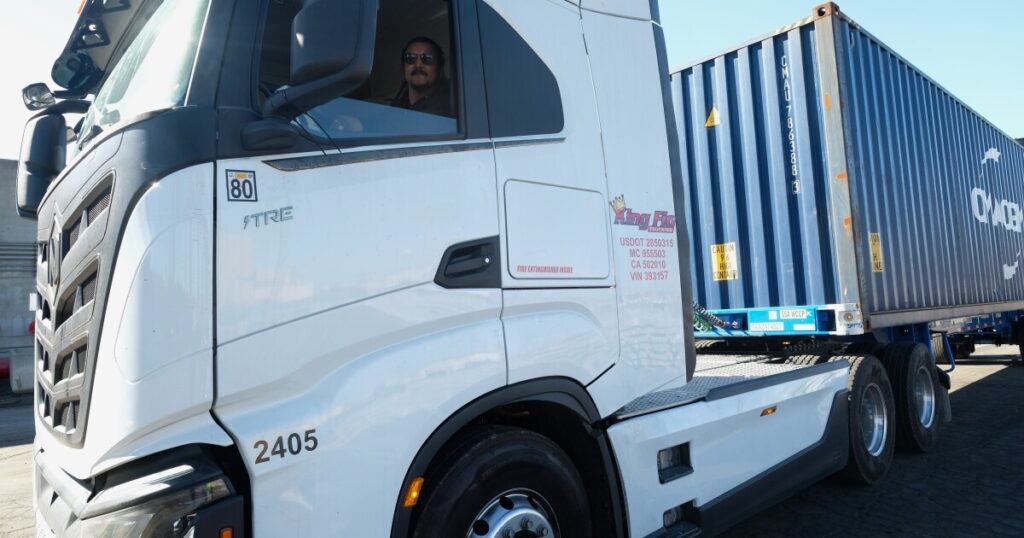Stay Updated with LAist
If you find this article engaging, subscribe to our daily newsletter, The LA Report. Each weekday, you can catch up on the five most vital stories in just three minutes or less.
As diesel trucks wait their turn at a terminal in the Port of Long Beach, an electric big-rig truck enters a nearby area under one of the tall port bridges. This location is designated to be one of California’s largest charging depots for electric trucks, capable of servicing up to 500 trucks daily by summer. The truck is owned by Jennie Abarca, who runs King Fio Trucking, a business in Long Beach that transports shipping containers from the ports to warehouses across Southern California. Abarca has transitioned eight of her 32 trucks to fully electric.
However, her confidence in the industry’s future has been shaken due to a suspension of a critical California rule aimed at phasing out diesel trucks, leaving her with feelings of betrayal and uncertainty.
A Legacy Driving Change
Jennie Abarca grew up in Whittier, where her father worked as a mechanic and auto shop teacher. “I’ve been exposed to engines and trucks, grease, and oil basically my entire life,” she remarked. She began her trucking career as a dispatcher in her twenties and partnered with her husband at a logistics company involved with port operations. They started their own trucking business about 15 years ago after purchasing their first truck, naming it King Fio in honor of Abarca’s grandfather, a WWII veteran and child of Italian immigrants.
While diesel trucks helped Abarca and her husband fulfill their vision of the American dream, Abarca believes that electric trucks are essential for sustaining it in the long run. She expressed her concerns regarding climate change, pollution, and her children’s future: “As a business owner, particularly one contributing to pollution, I feel a duty to do everything I can.”
Policy Challenges
Following the California Air Resources Board’s unanimous adoption of the diesel truck phaseout rule in 2023, Abarca focused on transitioning her fleet. The “Advanced Clean Fleets” rule mandates that all big-rigs serving ports be electric or hydrogen-powered by 2035. She aims to ensure her business evolves with the industry’s direction, having witnessed others fail to adapt.
However, the state has recently delayed the enforcement of this rule. To impose it, California required federal government approval, which was rescinded when the Air Resources Board unexpectedly withdrew its waiver request, citing anticipated challenges from the Trump administration.
Funding and Infrastructure Uncertainty
The Trump administration’s efforts to dismantle government incentives for building electric and hydrogen infrastructure further complicate matters for the trucking industry. Diesel semi-trucks account for a disproportionate segment of California’s emissions, thus transitioning to electric vehicles is vital to improve public health and mitigate pollution-related extreme weather events.
In Southern California, with the nation’s two largest ports, there are nearly 15,000 trucks working per month, yet only around 430 are electric or hydrogen-powered. The current infrastructure simply isn’t adequate to support a broad shift to electrification, and it takes substantial financial backing to facilitate this transition. Local incentive programs are in place, but these do not mandate a move away from diesel, creating ambiguity for both businesses and policymakers.
Business Viability Amidst Transition
The abrupt halt to the cleanup rule has relieved some trucking companies grappling with the costs associated with electric and hydrogen trucks, which can be three times more expensive than diesel models. Schrap emphasized that while technology continues to advance, the current pace is insufficient to keep up with regulatory demands. Meanwhile, companies that previously committed to supporting sustainable practices are now retracting their agreements, causing increased uncertainty in the industry.
Despite these challenges, some like Abarca remain committed to embracing electric trucks. She faced challenges securing financing for her electric fleet, which can range from $300,000 to $500,000 each. Ultimately, she managed to cover her costs through state grants and financing through Volvo. While her drivers enjoy the electric trucks’ efficiency and low maintenance, the impact on her financial bottom line has yet to be significant due to high charging costs and the reluctance of clients to pay increased fees.
Moving Forward with Optimism
Although the state’s decision to withdraw the waiver may delay the industry’s overall transition, Abarca is determined to continue diversifying her fleet. She plans to build a charging station at her truck yard in Lynwood, aiming to utilize carbon credits for additional financial benefits. Abarca believes that the trucking industry is on the brink of remarkable technological advancement: “We’ve evolved from horse-drawn carriages to where we are now. This is just another step forward, and regardless of political climate, this is the direction we’re headed.”


